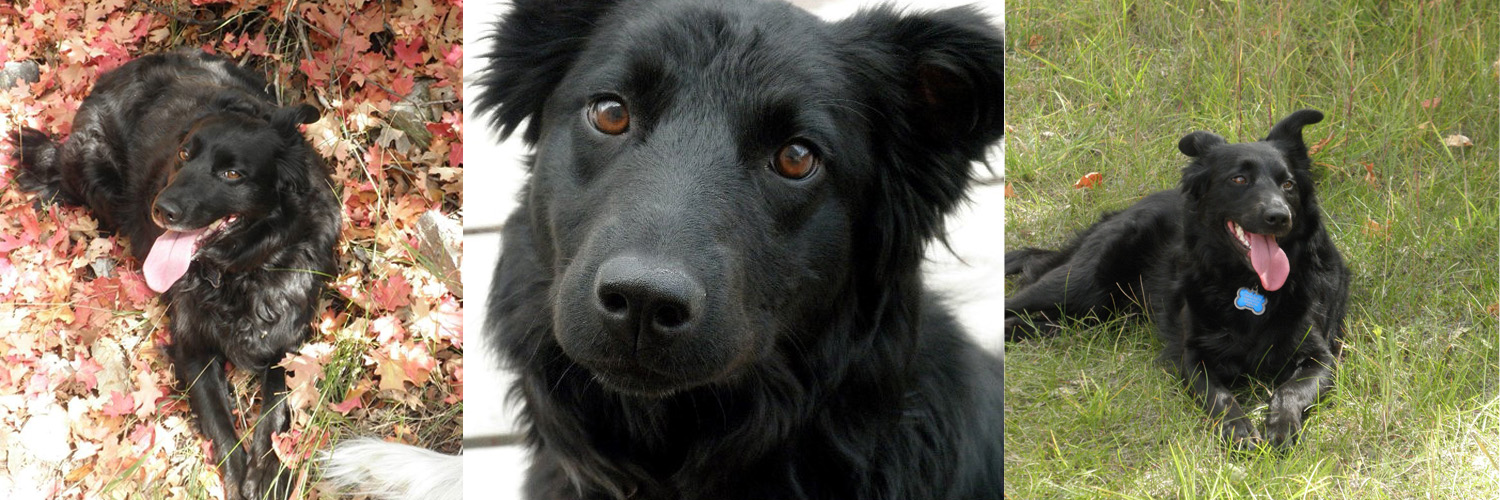Five years cancer-free. It’s a milestone for all cancer patients, but especially for our canine friends. While survival rates vary based on many factors, including the type of cancer and treatment, considering a dog’s lifespan, five years is cause for celebration.
Last month, Flint Animal Cancer Center patient, Elbee, a sweet, shy border collie, celebrated her fifth cancer-free anniversary and enjoyed her favorite treat – a Himalayan dog chew.
“She loves this special treat,” said Elbee’s human mom, Karen. “And it’s most definitely something she wouldn’t have been able to enjoy without the SRT treatment she received at the Flint Animal Cancer Center five years ago.”
Diagnosis: Oral Extramedullary Plasmacytoma
In November 2014, Karen noticed a growth on the top of Elbee’s mouth while Elbee was lying her back, playing one of her favorite games. After examination, their local veterinarian removed the lump and sent it for testing. The pathology results showed it was an oral extramedullary plasmacytoma, a type of tumor containing cancerous plasma cells. Plasamcytomas can originate in bone or soft tissue.
Despite surgery, in July 2015, Karen noticed the growth had returned. An MRI showed the tumor was spreading toward Elbee’s nasal cavity. At that point, Elbee’s veterinarian called the Flint Animal Cancer Center to schedule an appointment.
Treatment Options and Tough Decisions
On the first day at the Flint Animal Cancer Center, Karen learned Elbee had two options. The first was surgery. Due to the size of the tumor, surgeons would need to remove part of Elbee’s jaw. The tumor’s location also made it difficult to predict if the surgeons would achieve clean margins to eliminate all of the cancer.
“When I learned about the extent of the surgery, I know this sounds silly, but Elbee loves to chew … on toys, on treats … and it made me sad to think about her not being able to chew,” said Karen. “I wanted her to have the best quality of life, and for her, I thought that included chewing.”
Karen then heard about a novel treatment option and spoke with FACC’s radiation oncologists to learn more. The team proposed Stereotactic Radiation Therapy (SRT) to treat the tumor. Elbee would be the first patient to receive SRT for an oral plasmacytoma, but they knew that plasmacytomas in other parts of the body respond well to radiation. Based on that knowledge, they had reason to believe that Elbee’s tumor would respond to radiation.
“The team at the cancer center were wonderful, they explained everything so well, but we agonized over the decision,” Karen said. “Radiation was more expensive. Surgery wasn’t a guarantee, but they hadn’t treated this type of oral tumor with radiation. We just took a deep breath and said, let’s try radiation.”
After three days of SRT, Elbee returned home to Utah. Back at home, Karen and her husband followed all directions for home care and kept regular visits with their local veterinarian to carefully monitor Elbee.
“We had lots of worries following treatment,” said Karen. “We worried it wouldn’t work or that the cancer would return or spread, but we also had hope.”
“Eventually, our vet told us not to worry anymore, that Elbee would be okay.”
Lessons Learned
Five years later, Karen looks at Elbee and sees her happy girl living her best life. Through her experiences with Elbee and two other dogs diagnosed with cancer, Karen is an advocate for early detection.
“It’s important to know your dog well, and when something is out of the ordinary, get it checked out.”
Karen wants other pet lovers to know that there are treatment options available and that the field of veterinary oncology continues to provide new hope for pets diagnosed with cancer. To help, Karen also sends annual updates to the FACC team to track Elbee’s progress.
“I am so grateful for the compassionate and thorough care Elbee received at the Flint Animal Cancer Center and the fantastic results of her treatment. As the first case, the results were nothing short of a miracle. Now, I hope the knowledge gained from Elbee’s treatment will also help other pets with cancer.”

Learn more about the warning signs of pet cancer.
The Flint Animal Cancer Center is grateful for the support of friends who help us advance cancer treatment options, provide clinical expertise, and offer compassionate care for all patients. We welcome new friends to our community. Please consider donating today.